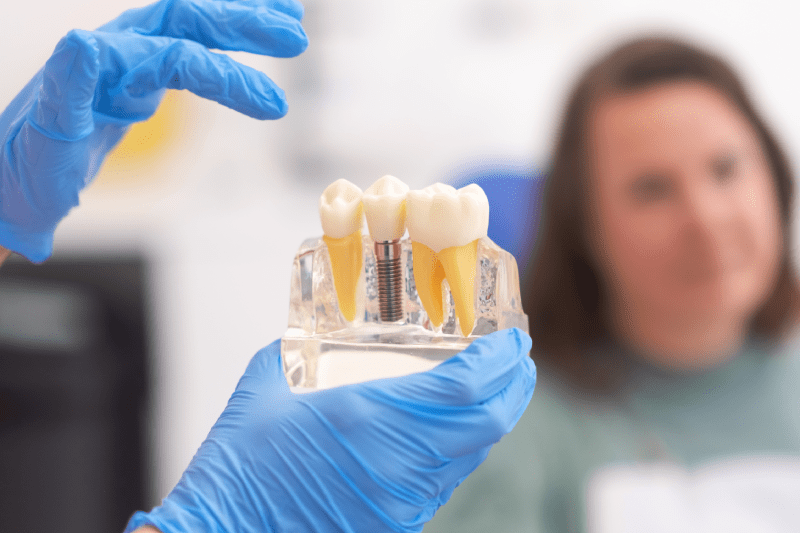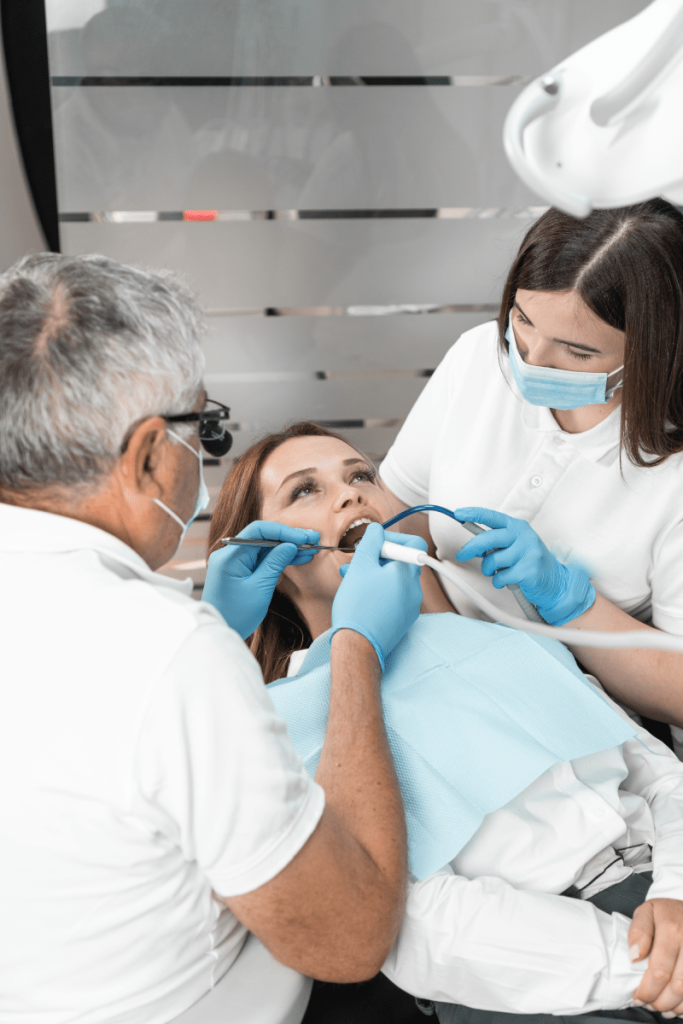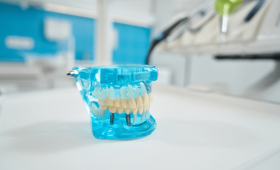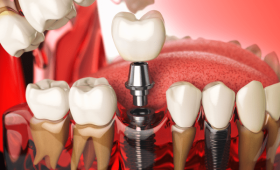What Are the Main Factors Affecting the Cost of Dental Implants?
The total cost of dental implant treatment is composed of a combination of many different factors. Among these factors, the brand and quality of the implant to be used, the number of implants, and the patient’s general oral health condition stand out.
Additionally, whether supplementary surgical procedures such as bone grafting or sinus lifting are necessary, the dentist’s level of experience, the clinic’s location, and its technological infrastructure are also important elements that directly affect the cost. Since every patient’s situation is different, the cost must be determined with a personalized treatment plan.
How Much Does a Single Tooth Implant Cost in Budapest?
Budapest is one of the most popular destinations for dental treatment in Europe. The cost of a single dental implant, including the implant itself, the surgical procedure, and the prosthesis, generally ranges from 600 Euros to 1,500 Euros. These prices are quite competitive compared to those in Western European countries or the USA. Prices can vary depending on the clinic, the dentist’s expertise, and the selected implant brand.
What Are the Reasons for the Low Prices in Hungary?
The main reasons for the lower dental implant prices in Hungary compared to Western European countries include more affordable general living expenses and operational costs. Clinics have lower staff salaries, rent, and general operational expenses. This situation creates a cost advantage without compromising the quality of healthcare services. Additionally, the developed medical tourism sector in Hungary increases competition, keeping prices at reasonable levels.
What Should Be Thought About the Quality of Clinics in Budapest?
Budapest is one of the leading cities in Europe in terms of dental education and clinical quality. The country’s dental schools provide education at international standards, and clinics generally have modern technology. Many clinics use high hygiene standards and state-of-the-art equipment to serve international patients. Therefore, it should be known that the low price does not mean low-quality service but rather stems from the country’s economic conditions.
How Is the Price Difference for a Single Implant Compared?
The cost of a single dental implant in Hungary is significantly lower than the average prices in Western Europe. For example, while the cost of a single implant in Germany or the UK can range from 2,000 Euros to 4,000 Euros, in Budapest, this price can start around 600 Euros. This price difference provides serious savings, especially for patients who need more than one dental implant.
How Much Do Full-Mouth Dental Implants Cost in Budapest?
Full-mouth dental implant treatment is also a high-cost procedure in Budapest, but it is still more economical than in other countries. The cost of a full-mouth restoration using techniques like All-on-4 or All-on-6 can range from 4,000 Euros to 8,000 Euros. This price includes the surgical operations, the implants, and the full-mouth prosthesis. This makes Budapest an attractive option for patients considering a full-mouth restoration.

What Services Are Included in Price Quotes? Are There Hidden Costs?
When reviewing price quotes, it is very important to ask what is included. Generally, the initial price quote includes the implant itself, the surgical placement procedure, and the basic prosthesis. However, additional procedures such as bone grafting, sinus lifting, tooth extraction, or temporary dental prostheses may be billed separately. Therefore, getting a detailed breakdown of all costs and confirming it in writing before starting the treatment is vital to avoid unexpected expenses.
What Is the Cost of Bone Grafting and Sinus Lifting Procedures?
Additional procedures such as bone grafting and sinus lifting, which are applied to patients who do not have sufficient jawbone volume, increase the total cost. In Budapest, the cost of such additional surgical procedures can vary between 200 Euros and 600 Euros. This price changes depending on the type of graft material used and the complexity of the procedure.
What Are the Advantages of Getting Dental Implants in Budapest?
The biggest advantage of getting dental implants in Budapest is the opportunity to receive high-quality service at affordable prices. Additionally, dental clinics in Hungary that cater to dental tourism provide patient-focused service, and appointment waiting times are generally short. This allows patients to complete their treatment processes more quickly. The city’s historical and touristic structure also turns the treatment process into a pleasant trip.
What Are the Most Popular Implant Brands in Budapest?
Dental clinics in Budapest generally use internationally recognized and quality-proven implant brands. Brands such as Straumann (Switzerland), Nobel Biocare (Switzerland), Astra Tech (Sweden), and Alpha-Bio Tec (Israel) are frequently preferred. These brands are known for their longevity, biocompatibility, and high success rate.
How to Identify a Quality Implant Brand?
A quality implant brand must have proven its success through long-term clinical studies. Having international certifications like CE or FDA indicates the reliability of the product. Quality implants are generally made from pure titanium or zirconium materials and integrate securely with the bone. Asking your dentist about the brand they use and researching its references will help you make the right choice.
How Long Does Dental Implant Treatment Take?
Dental implant treatment is generally a two-stage process and can take a few months in total. In the first stage, the implant is placed into the jawbone, and a waiting period of 2-6 months is required for it to fuse with the bone (osseointegration). In the second stage, the prosthesis is placed on the implant. Especially for patients coming from abroad, these processes can be optimized according to the travel plan.
What Is the Success Rate of Implant Treatment?
The success rate of dental implants is quite high, generally over 95%. The success rate depends on the patient’s general health, oral hygiene, and the dentist’s experience. With regular check-ups and proper care, the lifespan of the implants is extended.
Is Implant Treatment Painful?
Dental implant treatment is performed under local anesthesia, so no pain is felt during the procedure. After the procedure, mild pain and swelling may occur, but this can be easily controlled with painkillers prescribed by the dentist. The recovery process is generally completed within a few days.
Are Clinics in Hungary Safe? How Can I Tell?
Many clinics in Hungary have high hygiene and safety standards. To choose a reliable clinic, it is important to review the dentists’ areas of expertise and experience, the clinics’ references in international patient services, and patient reviews. Additionally, asking about the implant brands used by the clinic and its technological equipment helps you confirm reliability.
How Much Are Travel and Accommodation Costs to Budapest?
Travel and accommodation costs to Budapest vary depending on your home country and the travel season. Round-trip air tickets from Europe are generally affordable. For accommodation, there are hotel and apartment options available for every budget. Most clinics facilitate patients’ travel by including services such as airport transfers and even accommodation in their treatment packages.
How Should a Travel Plan for Treatment in Budapest Be Made?
Patients traveling to Budapest for implant treatment may need to plan at least two separate visits. The first visit, for the placement of the implants, usually takes 3-5 days. The second visit, for the placement of the prostheses after the implants have fused with the bone, can take 5-7 days. The travel plan should be arranged in advance according to the clinic’s treatment schedule and personal needs.
What Is the Difference Between All-on-4 and All-on-6 for Full-Mouth Prostheses?
The All-on-4 and All-on-6 techniques are fixed prosthesis methods applied to patients with a completely toothless jaw. As the name suggests, All-on-4 allows for all teeth to be placed on just 4 implants. All-on-6 uses 6 implants. The choice of these techniques depends on the density of the jawbone and the dentist’s evaluation. Generally, the All-on-6 technique provides a stronger support.
What Documents Are Required for Implant Treatment?
For patients coming from abroad, a passport, ID, and a list of documents showing medical history are usually sufficient. Providing information about medications used and any chronic diseases will help the dentist create an accurate treatment plan.
Is There English or German-Speaking Staff During the Treatment Process?
Most clinics in Budapest that focus on medical tourism have staff who can speak multiple languages, especially English and German, to serve international patients. This ensures that patients can complete their treatment processes without communication problems.
How Does the Initial Examination Process Before Treatment Work?
The initial examination before treatment forms the foundation of implant treatment. At this stage, the dentist performs an oral examination of the patient, evaluates the condition of the jawbone using imaging techniques such as panoramic X-rays or 3D tomography. Afterward, they create the most suitable treatment plan in line with the patient’s expectations and medical history.
Is VAT Included in the Treatment Price?
In Hungary, the VAT rate on healthcare services is generally low or not applied at all for some procedures. However, when getting a price quote, it is important to ask whether VAT is included in the price. A transparent price presentation is necessary to avoid any surprises.
What Is the Warranty Period for Implants?
Many implant brands offer a lifetime warranty for the implant itself. However, this warranty is only valid in cases where the implant breaks or comes loose. The warranty period for prostheses and other surgical procedures varies according to the clinic and the dentist’s policy. Generally, a warranty period of 1-5 years is given for prostheses.
In Which Situations Can Implants Not Be Done?
Dental implants are a feasible treatment method in many situations. However, in patients with chronic diseases such as uncontrolled diabetes, serious heart diseases, immune system disorders, or osteoporosis, implant treatment can be risky. Oral infections or insufficient bone structure may also require postponing the treatment.
How Should Oral Care Be Performed After Implant Treatment?
Oral hygiene after implant treatment is of vital importance for the lifespan of the implant. You should brush your teeth at least twice a day and use dental floss and interdental brushes. Following your dentist’s recommendations and going for regular check-ups is very important to detect possible problems early.
What Materials Are Used in Implant Treatment?
Implants are generally made from biocompatible titanium. This material provides excellent compatibility with the human body and has a high ability to fuse with bone. Prostheses can be made from materials such as zirconium, metal-supported porcelain, or full porcelain. Zirconium is one of the most preferred materials in terms of aesthetics and durability.
How to Get to Clinics in Budapest?
Budapest has a well-developed public transportation network. You can easily get from the airport to the city center. Most clinics are located in central areas of the city and can be easily accessed by metro, tram, or bus. Some clinics also offer additional services such as airport transfers to increase patient comfort.

When Is the Best Time for Treatment?
The best time for implant treatment depends on your personal schedule and the climate. Since Budapest is a city that attracts tourists throughout the year, you can get treated in any season. The spring and autumn months are generally preferred due to more temperate weather conditions.
Information About Payment Methods and Currency
In clinics in Budapest, different payment methods such as Euro, Hungarian Forint (HUF), bank transfer, and credit card are generally accepted. When paying with a credit card, it may be useful to contact your bank in advance about exchange rate differences and international transaction fees.
Is Aesthetics Important in Implant-Supported Prostheses?
Implant-supported prostheses replace natural teeth both aesthetically and functionally. The color, shape, and size of the prosthesis are specially designed to match the patient’s facial structure and other teeth. By using aesthetic materials like zirconium, a natural and shiny appearance is achieved, which improves the patient’s smile aesthetics.
In Which Situations Are All-on-4/6 Applied?
The All-on-4 and All-on-6 techniques are generally applied to patients who are completely toothless or have very few remaining teeth that need to be extracted. These methods, provided the patient’s bone structure is suitable, provide a fast and effective full-mouth restoration. They offer a cost and time advantage compared to traditional implant treatment as fewer implants are used.
How to Make an Appointment for Implant Treatment?
Appointments with clinics in Budapest are usually made by contacting them via email, phone, or their websites. Most clinics may ask patients to send panoramic X-rays or other images for the initial examination. This allows the treatment plan to be prepared in advance, speeding up the process.
What Is the Age Limit for Dental Implant Treatment?
The lower age limit for dental implants is the completion of jawbone development, which is generally 18 years of age and older. There is no upper age limit; anyone in good general health can undergo implant treatment.
What Are the Most Important Questions to Ask When Getting a Price Quote?
When getting a price quote, you should ask what the price covers, which implant brand will be used, what the additional costs might be, the duration of the treatment, and whether the clinic has English-speaking staff for patient services. Transparent and open communication is very important for a smooth treatment process.
What Is the Difference Between Implant Treatment and Bridge Treatment?
While implant treatment replaces a missing tooth by placing an artificial root, mimicking the natural structure of the tooth, bridge treatment requires the neighboring teeth to be reduced to place the missing tooth. Implants are a more protective treatment method as they can be applied alone without damaging the neighboring teeth.
What Factors Affect the Success of Implant Treatment?
The success of implant treatment depends on the dentist’s experience, the quality of the implant used, the patient’s oral hygiene, and general health status. All these factors must be present together for a successful outcome. Especially conditions like smoking and diabetes can negatively affect the success rate.
How Are Post-Treatment Check-ups Done in Budapest?
After the treatment is completed, most clinics provide their patients with a schedule for periodic check-ups. For patients coming from abroad, these check-ups can usually be done by local dentists or by returning to Budapest. Some clinics may also follow up with their patients via remote communication.



